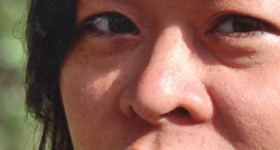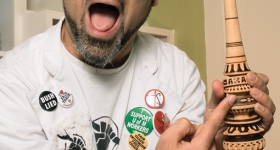After visiting Southeast Asia in 2002, Chan and Saopeng, who is of Laotian descent, realized that the story of Laotian refugees desperately needed to be told. The two artists decided to travel around the country, collecting oral histories, and forming the skeletal structure for their performance piece. The inaugural performance occurred in June 2007 at the National Asian American Theatre Festival in New York. Since then, Chan and Saopeng have performed nationally, holding workshops and spending time with members of Laotian communities. In Alaska, they were able to rewrite scenes in response to the community and to invite local performers to participate in the project.Refugee Nation weaves together monologues of Laotian refugees and their descendants, connecting the narratives across generations in an effort to mend the gap that separates many refugees from their children. At one point in the performance, a Laotian war prisoner and an incarcerated gang member in the U.S. dialogue across time and space. Chan explains, "Both men found themselves in a war that wasn't necessarily their war." The gang member does not know that he isn't a U.S. citizen until he faces deportation. It is only because of his arrest that he discovers what his Laotian parents went through and realizes that his mother suffers from Post Traumatic Stress Disorder.
When Chan and Saopeng realized that many Laotian refugees suffer from PTSD, they worried that Refugee Nation might aggravate traumatic memories. But after consulting mental health specialists, they found that talking about the past is the first step toward healing. Chan says, "It's not just theoretical healing. It's actual healing that comes from sharing the stories."









Comments